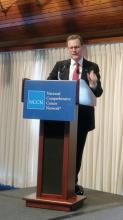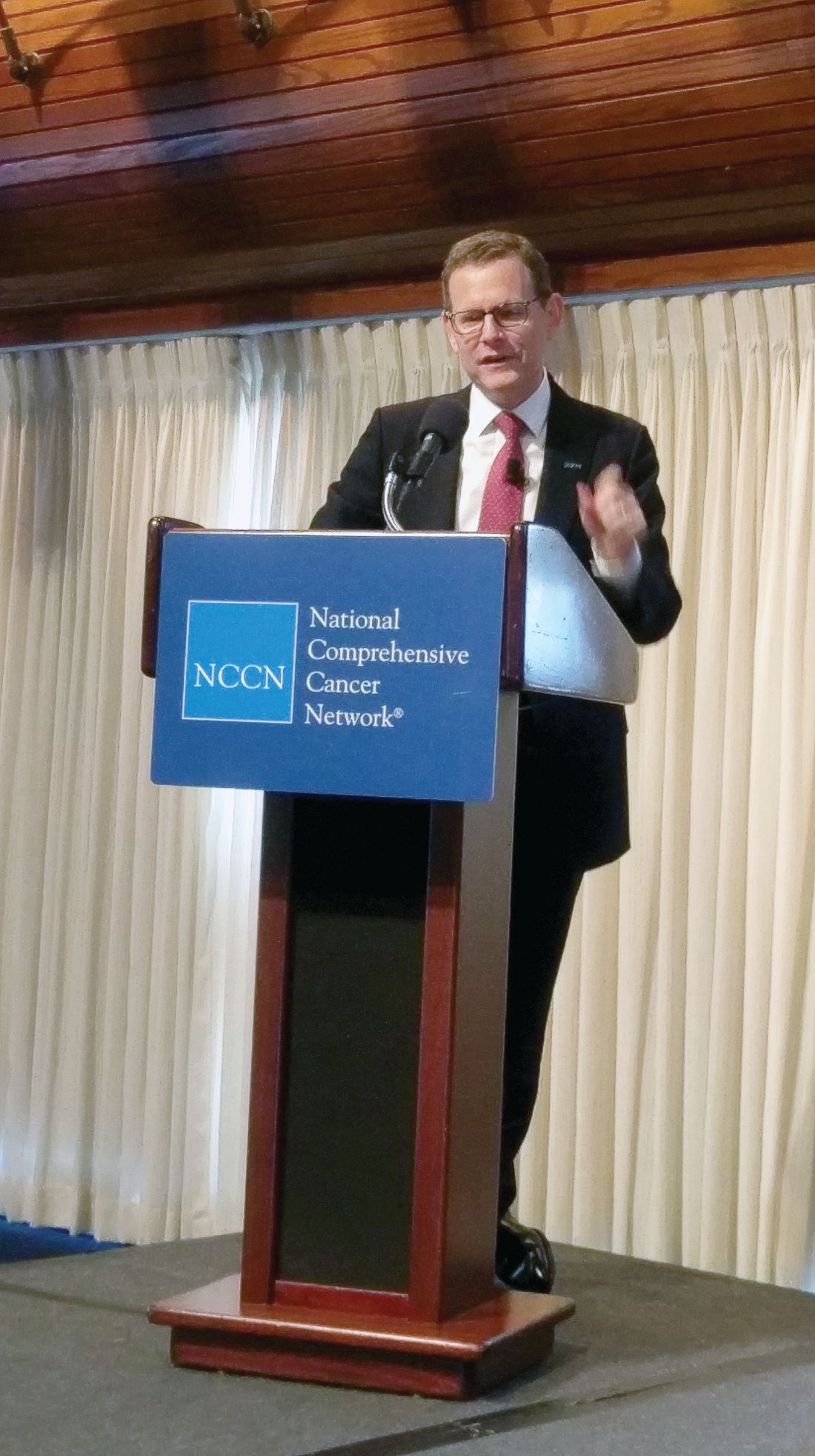User login
GOP senators shutting out physician input on reform – ASCO CEO
WASHINGTON – Physician associations are having an easy time finding people on Capitol Hill willing to listen when it comes to health care reform, but it appears that the conversations are falling on deaf ears, according to Clifford Hudis, MD, CEO of the American Society of Clinical Oncology.
“I am dismayed that our opinions are not being valued,” Dr. Hudis said at a policy summit hosted by the National Comprehensive Cancer Network.
He was critical of the current skyrocketing prices of oncology treatments but noted that, the way the current market is set up, there is no incentive anywhere in the system to put any pressure on manufacturers.
“Right now, the market forces, such as they are, not only allow this but encourage it and probably will continue to do so for a little longer,” he said, adding that the environment is such that “a majority of Americans want the government to do something about price. Think about that for a minute. That is a call for regulation, indirectly or directly. That’s a call for oversight. It’s a call for something different from the traditional open workings of a free market.”
He noted that, at least conceptually, the Trump administration is following in the footsteps of the Obama administration with an emphasis on value over volume, shared risk, and looking for improved outcomes.
In that vein, Dr. Hudis said there are rumblings that the much-criticized Part B demonstration that would put more emphasis on value-based payments to physicians for Part B drugs could return in some form, though he had no further details.
“Our position is that physicians should be accountable for utilization, for quality of care, and not for the price of the drug at market entry,” he said, noting ASCO’s opposition to the Part B demonstration as it was originally proposed.
That demonstration also highlighted another issue of value, particularly when there are no traditional market forces in play to help exert downward pressure on prices.
Defining value is problematic, and Dr. Hudis criticized the many value frameworks – including ASCO’s – as a signal that there is not enough being done to let the market truly make its determination on what is value.
“When we superimpose something like the value framework on this, we are essentially admitting a kind of defeat,” he said. “We are admitting that there won’t be traditional bid-counterbid price setting. There will instead be a declaration of value ultimately leading to pricing.”
“They are a declaration that somebody, through opinion or formula, will start to tell you collectively what a therapy is worth,” he added. “That’s like somebody telling you what an automobile is worth. It doesn’t really work that way in the rest of your world. You make a judgment for yourself about what something is worth. … One thing I know for sure is that for most patients, most new drugs are not worth their current price.”
WASHINGTON – Physician associations are having an easy time finding people on Capitol Hill willing to listen when it comes to health care reform, but it appears that the conversations are falling on deaf ears, according to Clifford Hudis, MD, CEO of the American Society of Clinical Oncology.
“I am dismayed that our opinions are not being valued,” Dr. Hudis said at a policy summit hosted by the National Comprehensive Cancer Network.
He was critical of the current skyrocketing prices of oncology treatments but noted that, the way the current market is set up, there is no incentive anywhere in the system to put any pressure on manufacturers.
“Right now, the market forces, such as they are, not only allow this but encourage it and probably will continue to do so for a little longer,” he said, adding that the environment is such that “a majority of Americans want the government to do something about price. Think about that for a minute. That is a call for regulation, indirectly or directly. That’s a call for oversight. It’s a call for something different from the traditional open workings of a free market.”
He noted that, at least conceptually, the Trump administration is following in the footsteps of the Obama administration with an emphasis on value over volume, shared risk, and looking for improved outcomes.
In that vein, Dr. Hudis said there are rumblings that the much-criticized Part B demonstration that would put more emphasis on value-based payments to physicians for Part B drugs could return in some form, though he had no further details.
“Our position is that physicians should be accountable for utilization, for quality of care, and not for the price of the drug at market entry,” he said, noting ASCO’s opposition to the Part B demonstration as it was originally proposed.
That demonstration also highlighted another issue of value, particularly when there are no traditional market forces in play to help exert downward pressure on prices.
Defining value is problematic, and Dr. Hudis criticized the many value frameworks – including ASCO’s – as a signal that there is not enough being done to let the market truly make its determination on what is value.
“When we superimpose something like the value framework on this, we are essentially admitting a kind of defeat,” he said. “We are admitting that there won’t be traditional bid-counterbid price setting. There will instead be a declaration of value ultimately leading to pricing.”
“They are a declaration that somebody, through opinion or formula, will start to tell you collectively what a therapy is worth,” he added. “That’s like somebody telling you what an automobile is worth. It doesn’t really work that way in the rest of your world. You make a judgment for yourself about what something is worth. … One thing I know for sure is that for most patients, most new drugs are not worth their current price.”
WASHINGTON – Physician associations are having an easy time finding people on Capitol Hill willing to listen when it comes to health care reform, but it appears that the conversations are falling on deaf ears, according to Clifford Hudis, MD, CEO of the American Society of Clinical Oncology.
“I am dismayed that our opinions are not being valued,” Dr. Hudis said at a policy summit hosted by the National Comprehensive Cancer Network.
He was critical of the current skyrocketing prices of oncology treatments but noted that, the way the current market is set up, there is no incentive anywhere in the system to put any pressure on manufacturers.
“Right now, the market forces, such as they are, not only allow this but encourage it and probably will continue to do so for a little longer,” he said, adding that the environment is such that “a majority of Americans want the government to do something about price. Think about that for a minute. That is a call for regulation, indirectly or directly. That’s a call for oversight. It’s a call for something different from the traditional open workings of a free market.”
He noted that, at least conceptually, the Trump administration is following in the footsteps of the Obama administration with an emphasis on value over volume, shared risk, and looking for improved outcomes.
In that vein, Dr. Hudis said there are rumblings that the much-criticized Part B demonstration that would put more emphasis on value-based payments to physicians for Part B drugs could return in some form, though he had no further details.
“Our position is that physicians should be accountable for utilization, for quality of care, and not for the price of the drug at market entry,” he said, noting ASCO’s opposition to the Part B demonstration as it was originally proposed.
That demonstration also highlighted another issue of value, particularly when there are no traditional market forces in play to help exert downward pressure on prices.
Defining value is problematic, and Dr. Hudis criticized the many value frameworks – including ASCO’s – as a signal that there is not enough being done to let the market truly make its determination on what is value.
“When we superimpose something like the value framework on this, we are essentially admitting a kind of defeat,” he said. “We are admitting that there won’t be traditional bid-counterbid price setting. There will instead be a declaration of value ultimately leading to pricing.”
“They are a declaration that somebody, through opinion or formula, will start to tell you collectively what a therapy is worth,” he added. “That’s like somebody telling you what an automobile is worth. It doesn’t really work that way in the rest of your world. You make a judgment for yourself about what something is worth. … One thing I know for sure is that for most patients, most new drugs are not worth their current price.”
AT NCCN POLICY SUMMIT

